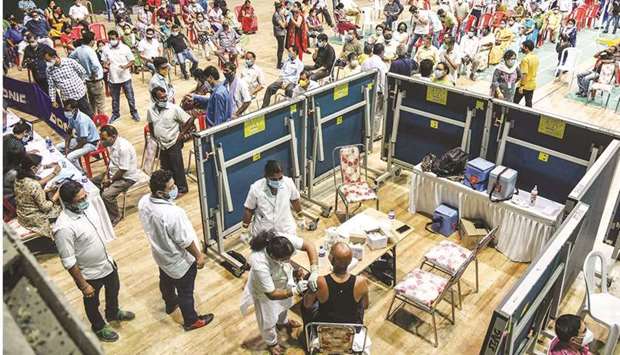India recorded the world’s highest daily tally of 314,835 Covid-19 infections yesterday as a second wave of the pandemic raised new fears about the ability of crumbling health services to cope.
Health officials across northern and western India, including the capital, New Delhi, said they were in crisis, with most hospitals full and running out of oxygen.
Some doctors advised patients to stay at home, while a crematorium in the eastern city of Muzaffarpur said it was being overwhelmed with bodies, and grieving families had to wait their turn.
A crematorium east of Delhi built funeral pyres in its parking lot. “Right now there are no beds, no oxygen. Everything else is secondary,” said Shahid Jameel, a virologist and director of the Trivedi School of Biosciences at Ashoka University. “The infrastructure is crumbling.”
Six hospitals in New Delhi had run out of oxygen, according to a tally shared by the city government, and the city’s deputy chief minister said neighbouring states were holding back supplies for their own needs.
“It might become difficult for hospitals here to save lives,” Manish Sisodia said in a televised address.
Another 2,104 people died in the space of a day, taking India’s cumulative toll to 184,657, according to the health ministry data.
The previous record rise in cases was in the US, which had 297,430 new cases on one day in January, though its infection rate has since fallen sharply.
Television showed images of people with empty oxygen cylinders crowding refilling facilities, hoping to save relatives in hospital.
In the western city of Ahmedabad, a man strapped to an oxygen cylinder lay in the back of a car outside a hospital as he waited for a bed.
“Helplessness,” tweeted former foreign secretary Nirupama Menon Rao. “India weeps.” “We never thought a second wave would hit us so hard,” Kiran Mazumdar Shaw, executive chairman of the healthcare firm Biocon, wrote in the Economic Times. “Complacency led to unanticipated shortages of medicines, medical supplies and hospital beds.”
Delhi Health Minister Satyendar Jain said the city needed about 5,000 more intensive care beds.
Similar surges of infections, notably in South America, are threatening to overwhelm other health services.
China said it was willing to help India, although it was not immediately clear what this might consist of. Only a tiny fraction of the Indian population has received a vaccination.
Authorities have announced vaccines will be available to anyone over 18 from May 1, but experts say there will not be enough for the 600mn people who will become eligible.
Health experts say India let its guard down during the winter, when daily cases were about 10,000 and seemed to be under control, and lifted restrictions to allow big gatherings. New, more infectious variants of the virus, in particular a “double mutant” variant that originated in India, have helped accelerate the surge, but many also blame the politicians.
Prime Minister Narendra Modi’s government ordered an extensive lockdown in the early stages of the pandemic but has been wary of the economic costs of more tough restrictions.
UAE suspends flights from India
The United Arab Emirates (UAE) announced the suspension of all flights from India, including transit passengers, as coronavirus cases in the South Asian country spiked to global records, according to an AFP report. Some 300 flights a week were operating between the UAE and India before the ban was announced, according to local media, making the air corridor one of the busiest in the world. Passengers who have transited through India in the last 14 days are also not permitted to board from any other point to the UAE, reports added. “The decision to suspend flights came after studying and evaluating the epidemiological situation in India,” the General Civil Aviation Authority said in a statement carried on state news agency WAM. The GCAA said those coming from India through other countries must stay in that third destination for at least 14 days. UAE nationals and passengers in private jets are exempt from that requirement. Cargo flights between the two countries will continue after the ban, which comes into effect at 11.59pm on April 24 for a period of 10 days “that can be extended”. “This comes in response to the proactive precautionary and preventive health measures issued by all authorities concerned in the country to limit the spread” of the pandemic, WAM cited authorities as saying.

A medical worker (bottom C) inoculates a man with a dose of the Covaxin vaccine at an indoor stadium in Guwahati yesterday.
